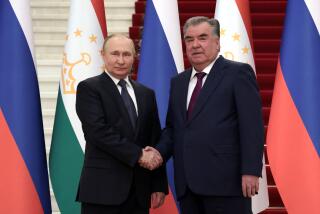Baker Finds Tajik President a Hard Sell : Diplomacy: Nabiyev stops short of endorsing a list of principles for Washington’s diplomatic recognition.
- Share via
DUSHANBE, Tajikistan — Sitting on the floor of a two-room Tajik rural house and eating roast pheasant with his hands, Secretary of State James A. Baker III seemed far away Thursday from the pin-striped diplomatic world he usually inhabits.
He stopped for carefully choreographed hospitality in the home of a teacher in the village of Romit at the edge of a spectacularly beautiful river gorge about 40 miles from the capital of this mountainous republic, which is sometimes called “the roof of the world.”
The outing, which also included a stop at a game reserve, followed an apparently inconclusive meeting with Tajik President Rakhman Nabiyev, the fifth leader of a former Soviet republic to see Baker in the last four days.
Unlike the previous stops--where the presidents of Moldova, Armenia, Azerbaijan and Turkmenistan publicly accepted American principles for diplomatic relations--Nabiyev apparently refused to accept all of the points, which include democratic politics, free market economics and human rights.
Baker’s trip to Romit was the sort of meet-the-people gesture that he usually shuns. Greeted by teen-age girls in colorful native costumes offering bread and salt, and by other girls who danced to the folk music of a group of elderly men playing drums and stringed instruments, Baker spent almost four hours on the excursion. He was given tea, apples, pheasant and other refreshments by Abousamat Abdul Bahobov, the village teacher.
As he gets farther from Washington, Baker seems to be relaxing his preferred business-only regimen. He spent about half an hour Thursday morning touring a rug factory in Turkmenistan after blazing through a market in Armenia in less than six minutes.
At a news conference with Nabiyev, Baker said the Tajik leader endorsed “some of the principles that are important to the United States.” Later Baker upped the count to “many,” but he never got more specific.
Nabiyev, a former Communist Party boss who won a contested election last year, did not mention the American principles in his brief, sometimes combative answers to reporters’ questions. The news conference ended abruptly after a reporter asked about the prospects of an Iran-style Islamic republic in Tajikistan, an impoverished state with longstanding cultural ties to Iran.
He replied that he had covered all that in an interview with two Tajik newspapers earlier this week. He offered to supply reporters traveling with Baker with a copy (which did not arrive Thursday), but when pressed to restate his views, Nabiyev announced that the news conference had gone on long enough; he strode away.
Tajik officials had expected Baker to extend diplomatic relations on the spot. When he did not, Nabiyev may have let his pique show.
Although Tajikistan has no common border with Iran, much of its population is of Iranian ancestry, and it uses a variant of the Persian language. Nabiyev has said he plans to make his first foreign visit to Iran.
One of Baker’s objectives on his swing through the Muslim republics of the former Soviet Union is to warn them to keep their distance from Tehran if they want friendly relations with Washington. But a senior State Department official conceded that most of the Central Asian republics desire good relations with nearby Iran.
Nabiyev did offer a flat assurance that Tajikistan “never sells uranium to foreign countries.” Published accounts earlier this week had suggested that the republic, which produces only a little uranium, was preparing to sell some of the material required for making nuclear weapons to Libya.
Earlier, President Saparmurad Niyazov of Turkmenistan pledged to follow international safeguards in uranium production and sales.
More to Read
Sign up for Essential California
The most important California stories and recommendations in your inbox every morning.
You may occasionally receive promotional content from the Los Angeles Times.









